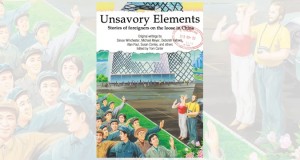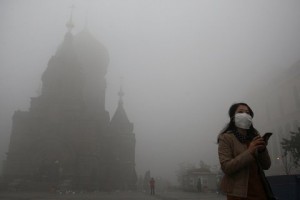
I’ve never met an expat in China who didn’t have his or her own extraordinary stories to tell, stories that at times made them stop and ask themselves, “What exactly am I doing here?” Every day one can experience an “only in China” moment, like waiting three hours to see a bank teller or seeing teenagers sleeping and snoring at an Internet cafe. I’ve described many such situations on this blog, like my being harassed for being a “laowai” in Kunming, or my delightfully nauseating experience at a Beijing duck restaurant, or my experience watching a beggar on a bus.
Having lived in Singapore and Taipei, I’ve been struck by the cities’ huge differences with China in terms of daily life. In the former two, there are rarely any surprises at all. They are great places to live, but they are also predictable (which is why expats with kids love living there). You are rarely taken aback by what you see on the street. China, as we all know, can be one surprise after another. We all have a battery of stories that prove it.
Which brings me to Tom Carter’s superb book of short stories, Unsavory Elements: Stories of Foreigners on the Loose in China, written by some of the most prominent writers in (or formerly in) China, like journalist and author Jonathan Watts, Alan Paul (author of Big in China), Deb Fallows (a linguist, author and wife of James Fallows), novelist and Fulbright Scholar Kaitlin Solimise, and an epilogue by the great Simon Winchester, author of The River at the Center of the World. And there are 23 others, most of them writers of incredible competence and backgrounds rich in China experience. Somehow, Tom Carter, the photographer behind the acclaimed photo-essay book China: Portrait of a People, has achieved the impossible, tracking down 28 of the most brilliant China hands and inducing them to write first-rate stories about some of their most exceptional experiences in China. (Peter Hessler also contributed a story, but it’s a piece he originally wrote for the New Yorker, the only story that wasn’t commissioned for the book.) Carter somehow got them all to deliver their stories, edited them and whipped them into a book that is fast paced (I read it in two or three sittings) and, like China, full of surprises.
It is impossible to write a thorough review of this book. That would take 28 posts, one for each story; trying to choose which ones to mention in this review is painful, because there is so much good in so many of them. You really need to read the whole thing. If you live in China or are curious about expat life there, this is required reading.
Like any book with 28 authors, there is going to be some unevenness. There was one story that I found disappointing, as I thought the author was puffing it up. One or two were too long, a couple were inconclusive and begged for more finality. But the remarkable thing is just how high the quality of nearly all the writing is and how remarkable the situations are, some of them downright bizarre.
Michael Levy, author of a book I should have reviewed a long time ago, Kosher Chinese, kicks the book off with the kind of moral dilemma China is known for: Michael, teaching at an English training school for rich Chinese kids, is offered a bribe to write the students’ admission letters so they can get into exclusive American boarding schools. At $1,000 an essay, it’s a tempting offer. Levy takes us into the world of teaching in China and, coming back to the bribe, leaves us hanging in a surprise ending.
One story that fascinated me for its sheer strangeness was by author Dominic Stevenson about his stay at a Shanghai prison for smuggling dope across the border. When I’ve read in the newspaper about foreigners being arrested in China and put in jail I’ve always wondered what they go through and how they survive. While this story isn’t poetic, it paints a wonderful picture of life behind bars and the special privileges foreigners enjoy there. (Despite some of the relative comforts they enjoy, it’s an experience I plan on never knowing first-hand.)
The most breathtaking story is told by Susie Gordon about her night out with a fabulously rich Chinese businessman who, with no second thought, plunks down $20,000 for a few bottles of wine in a single sitting. Describing one wild night with Mr. Zhou and his son and friends, Gordon transports us into the rarefied world of China’s super-rich, with all the luxuries, the trappings, the sins and temptations. She describes the behavior of Zhou’s son and his obscenely wealthy friends at a lavish karaoke bar operated by a friend, Yu Haiming.
The customary libation at KTV is whiskey mixed with green tea, or watery beer from tall green bottles, but Yu Haiming’s place was unsurprisingly different. He had two of the girls bring in a magnum of champagne, a little silver tray arrayed with slim white lines of powder that might have been coke but in all likelihood was ketamine, and pills nestled like candies in a brass bowl. At one point, I remember looking around at the girls, the men, the drugs and the money, and wondering how long this utopia could last: the Chinese dream in its second prodigal generation.
The entire story is a tour de force. And there’s much more: Deb Fallows’ observations on all the things you’re not allowed to do in China (the story is appropriately titled Bu Keyi), and how she and her husband came face to face with the law while shooting photos on Tiananmen Square on the 20th anniversary of the June 4 “incident.” Jonathan Watts making a visit to an environmentalist in the rain forests of Xishuangbanna. Bruce Humes’ truly harrowing depiction of his brutal mugging and subsequent experience in a Shenzhen hospital… The most poignant story is Kaitlin Solimine’s gorgeous depiction of her “second mother” when she lived in China as an exchange student, who became a lifelong friend.
Unsavory Elements is the title of editor Tom Carter’s own story, a tale of his visit with two friends to a seedy Chinese brothel in the countryside on a lane called “Teen Street.” The story has generated considerable controversy, as you can see in this review and its explosive comment thread. The story is hilarious — one of the friends is a consummate loser and Carter’s description of him caused me to laugh out loud. It took a lot of chutzpah to write a story like this, and I give Carter credit for his daring to tell a story that many expat men experience but usually choose not to tell to the world. I enjoyed reading this fast-paced piece, but I have to say that I understand why it is so controversial. The story is farce, and to shift gears and go the politically correct route and tell about the sorrows and tragedy of prostitution would have disrupted the tone. I thought, however, that Carter could have woven at least something into this story that conveyed a bit more empathy for the girls’ plight, without being preachy. It’s a hard thing to do, interjecting such a serious note into such a side-splitting narrative, but I know Carter has the skill to do this. Nevertheless the story stands out as one of the highlights of the book, another look behind the scenes of what most of us will never experience ourselves.
Do yourselves a favor and read the book. From high farce to heartbreaking poignancy, it’s all here, and you get to peer into aspects of China you may never have known about otherwise (like Dan Washburn’s trip deep into the Guizhou countryside, or Kay Bratt’s moving story of a girl in a Chinese orphanage). One can only marvel at Carter’s ability to get these stories written and then to draw them all together to form a unified whole. I’ve now read the book twice. It is a labor of love, and I think you’ll love it, too.


Comments